Setting Up Access Permissions for Categories
For categories, set the following permissions for departments, users, or roles.
- Access permissions
- Write permission
- Post comment permission
Bulletin board permissions vary by the security model applied to the board.
The default settings are as follows:
- Root:
The "GRANT (select target)" setting is set for the security model.
All users are allowed to view topics. - Sub categories:
- If you apply the parent category or the parent's subcategory access permissions to the category:
The security model and permissions of the selected parent category or parent's subcategory are applied. - If you do not apply the parent category or the parent's subcategory access permissions to the category:
The security model is set to "REVOKE (select a limit)".
All users are allowed to view and write topics and post comments.
- If you apply the parent category or the parent's subcategory access permissions to the category:
For information on permissions, refer to User Rights and Prioritized Access Permissions.
Setting User Rights
The example shows how to set access permissions when the security model is "GRANT (Only users on list have access)".
-
Click the administration menu icon (gear icon) in the header.
-
Click "System settings".
-
Select "Application settings" tab.
-
Click Bulletin Board.
-
Click Edit user rights.
-
On the "Edit user rights" screen, select a category and click "Edit".

-
On "User rights" screen, check that the security model is "GRANT (Only users on list have access)".
If the security model is set as "REVOKE (All users have access except users on list)", click "Change" to change the setting to "GRANT (Only users on list have access)". For details, refer to Changing the Security Model.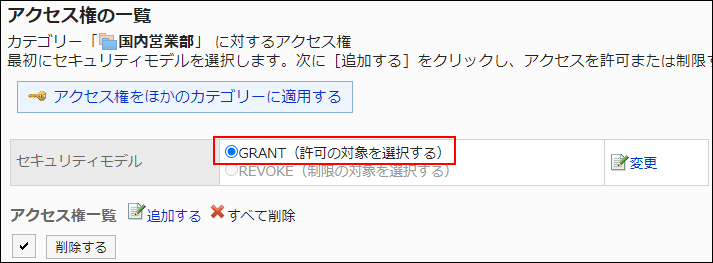
-
Click Add.
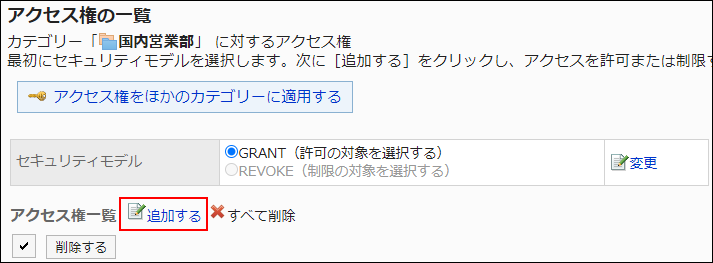
-
On "Add new entry" screen, select the department, user, or role to set permissions, and click Add.
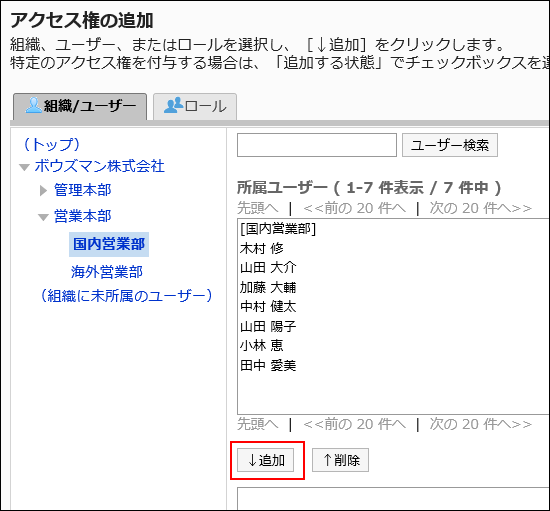 To select a role, switch the view to the Roles tab.
To select a role, switch the view to the Roles tab.
After you click "Add" then click the tab, the selected departments, users, or roles before you switch tabs are cleared. -
Under "User rights", select the checkboxes of the permissions to allow, and then click Add.
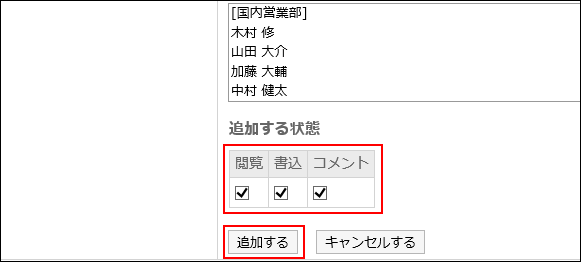
Combination of User Rights
When you control user actions of bulletin boards by user rights, only categories on which the logged in users can now work with are displayed on the bulletin board screen.
Screen showing users who have the user rights:
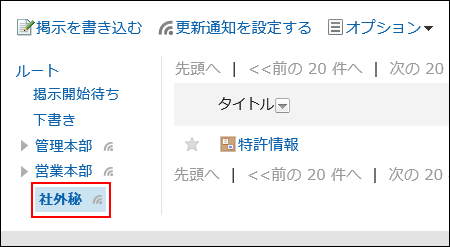
Screen showing users who do not have the user rights:
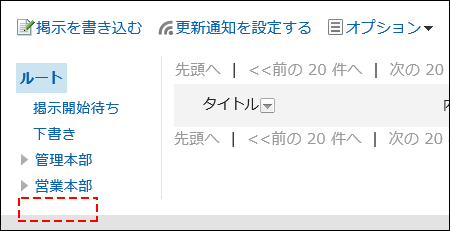
If the security model is "GRANT (Only users on the list have access)"
The example shows that the case in which the access permission security model for the confidential category is "GRANT (Only users on list have access)".
- Example of allowing Daisuke Kato to perform all the actions on confidential items:
Grant Daisuke Kato permissions to view and write topics, and add comments.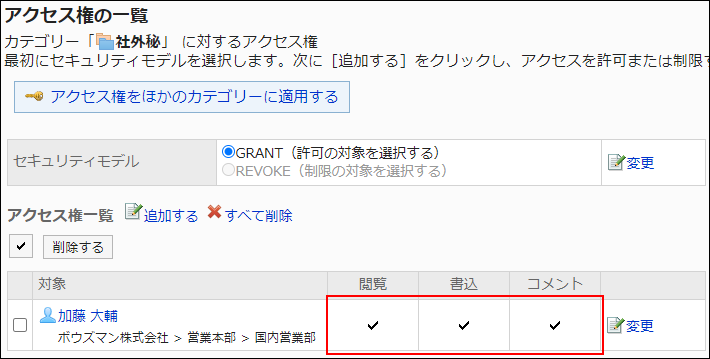
- Example of Allowing Daisuke Kato to Perform View Book Actions Only on Confidential Items:
Grant Daisuke Kato a permission to view items.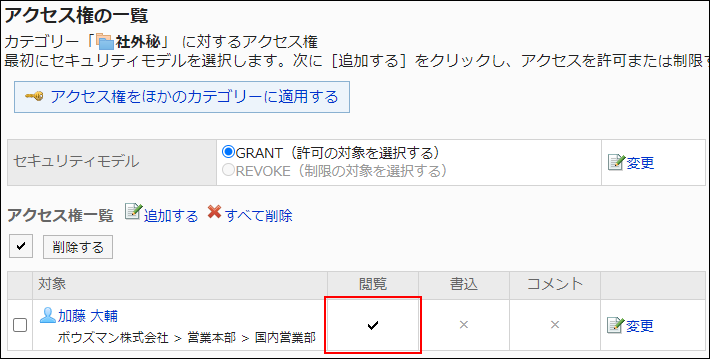
- Example of allowing Daisuke Kato to perform write topic actions on confidential items:
Grant Daisuke Kato permissions to view and write topics.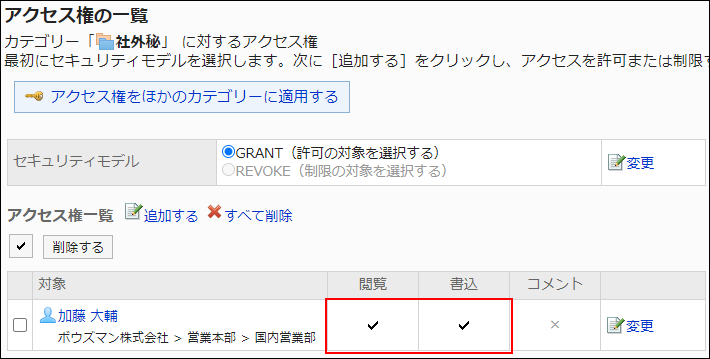
- Example of allowing Daisuke Kato to perform add comment actions on confidential items:
Grant Daisuke Kato permissions to view topics and add comments.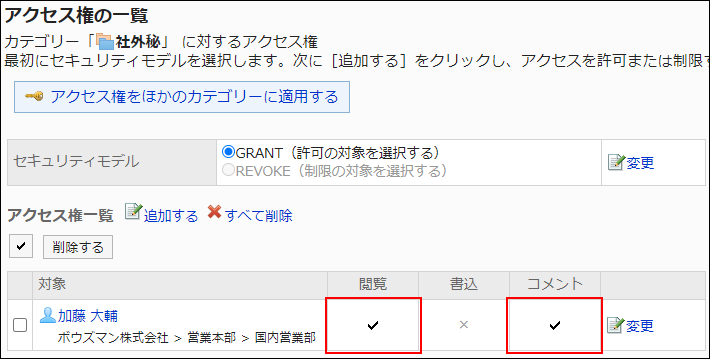
- Example of prohibiting Daisuke Kato to perform all the actions on confidential items:
Delete Daisuke Kato from the user rights list.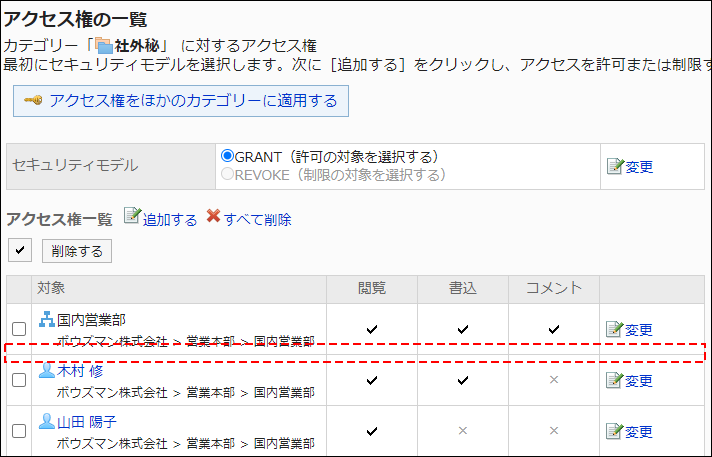
If the security model is "REVOKE (All users have access except users on the list)"
The example shows that the case in which the access permission security model for confidential folders is "REVOKE (All users have access except users on list)".
- Example of prohibiting Daisuke Kato to perform all the actions on confidential items:
Delete permissions to view and write topics, and add comments from Daisuke Kato.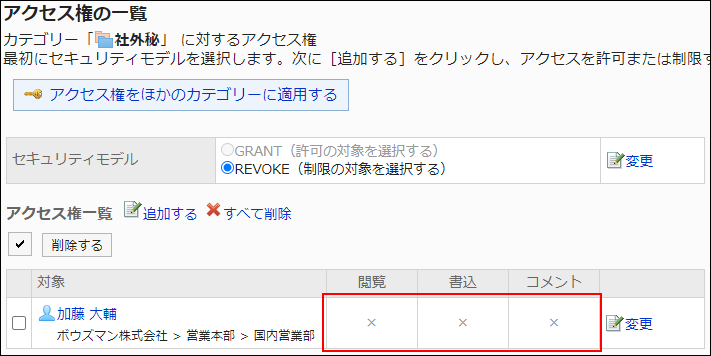
- Example of prohibiting Daisuke Kato to perform write topic actions on confidential items:
Delete a permission to write topics from Daisuke Kato.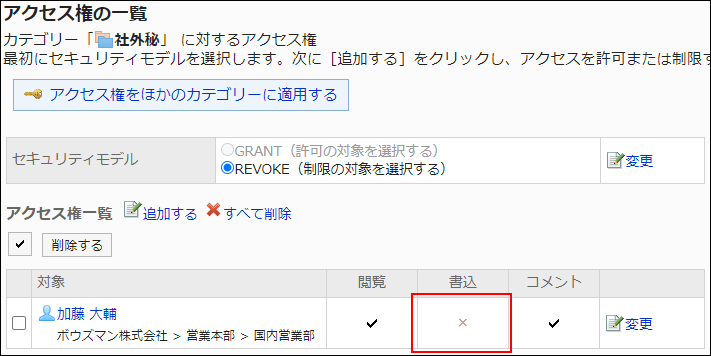
- Example of prohibiting Daisuke Kato to perform add comment actions on confidential items:
Delete a permission to add comments from Daisuke Kato.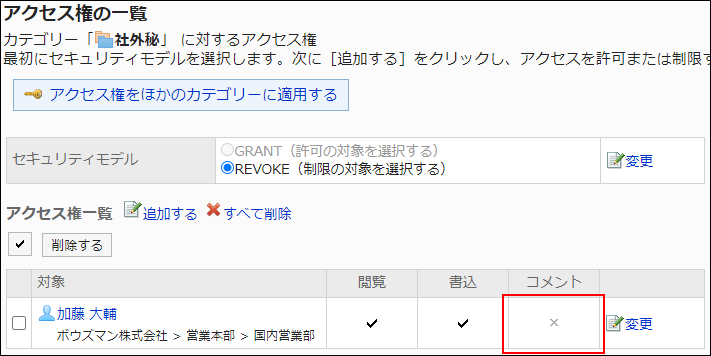
- Example of prohibiting Daisuke Kato to perform write topic actions and add comment actions on confidential items:
Delete permissions to write topics and add comments from Daisuke Kato.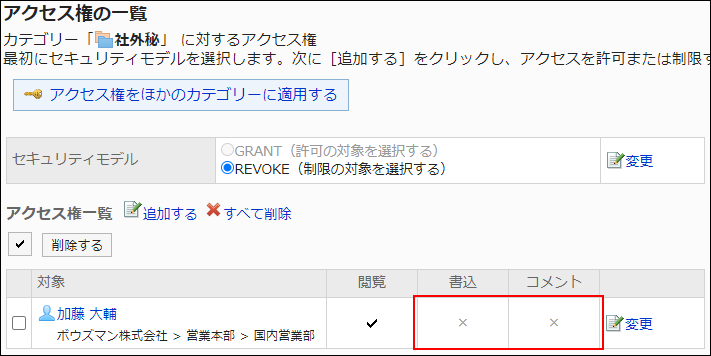
- Example of allowing Daisuke Kato to perform all the actions on confidential items:
Delete Daisuke Kato from the user rights list.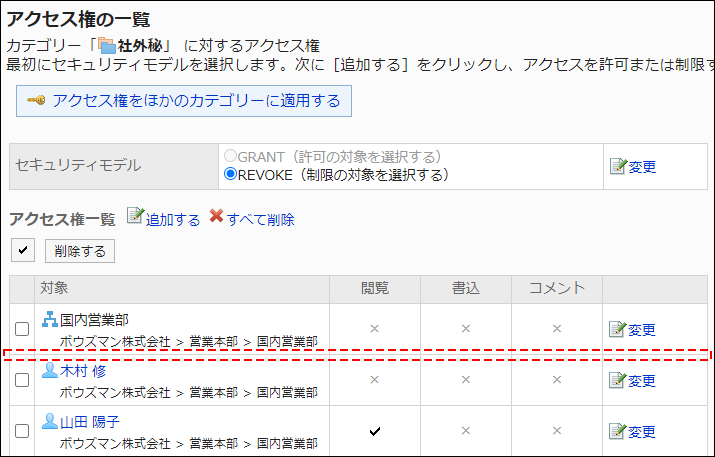
Changing User Rights
Change access permissions granted to users and departments.
-
Click the administration menu icon (gear icon) in the header.
-
Click "System settings".
-
Select "Application settings" tab.
-
Click Bulletin Board.
-
Click Edit user rights.
-
On the "Edit user rights" screen, select a category and click "Edit".

-
On "User rights" screen, click "Edit" to change the permission.
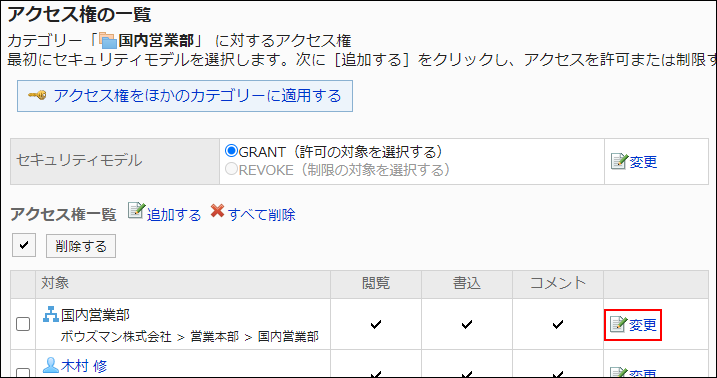
-
On "Edit user rights" screen, you can change the user rights as needed.
-
Confirm your settings and click "Save".
Deleting User Rights
Delete access permissions granted to users and departments.
If you delete user rights, actions that users can perform changes as follows depending on the security model:
- If the security model is "GRANT (Only users on list have access)":
Users who were deleted the user rights or users who belonged to the departments or roles that lost user rights no longer be able to work with items they previously could. - If the security model is "REVOKE (All users have access except users on list)":
Users who were deleted the user rights or users who belonged to the departments or roles that lost user rights can now work with items they prohibited to use.
Selecting and Deleting User Rights
Select and delete user rights.
-
Click the administration menu icon (gear icon) in the header.
-
Click "System settings".
-
Select "Application settings" tab.
-
Click Bulletin Board.
-
Click Edit user rights.
-
On the "Edit user rights" screen, select a category and click "Edit".

-
On "User rights" screen, select the checkboxes of the permissions to delete, and then click "Delete".
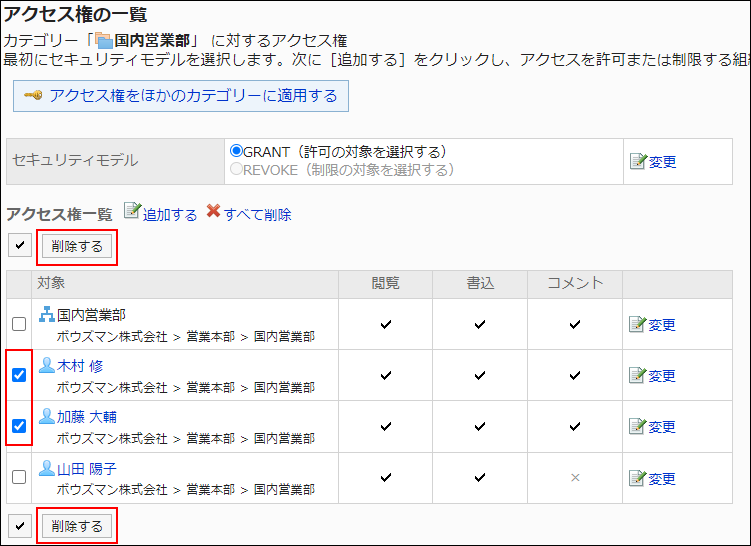
-
Click Yes on "Delete user rights" screen.
Deleting All User Rights
Delete all user rights.
-
Click the administration menu icon (gear icon) in the header.
-
Click "System settings".
-
Select "Application settings" tab.
-
Click Bulletin Board.
-
Click Edit user rights.
-
On the "Edit user rights" screen, select a category and click "Edit".

-
On "User rights" screen, click "Delete all".
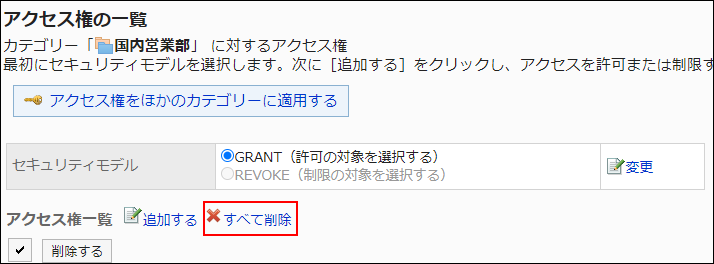
-
Click Yes on "Delete all user rights" screen.
Applying User Rights to Other Categories
Copy the user rights of a category and apply them to other categories.
The user rights settings in the destination categories are overwritten by the source category settings.
The user rights settings for other categories cannot be applied to the root.
If you change the settings in the source category after applying the user rights settings to other categories, the change will not be applied to the destination categories.
-
Click the administration menu icon (gear icon) in the header.
-
Click "System settings".
-
Select "Application settings" tab.
-
Click Bulletin Board.
-
Click Edit user rights.
-
On the "Edit user rights" screen, select the category from where to copy the user rights, and then click "Edit".

-
On "User rights" screen, click Copy user rights settings to another category.
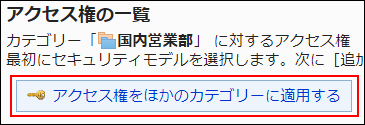
-
On the screen to apply user rights in bulk, select the checkbox for categories to apply user rights.
On the right side of the screen, a list of user rights settings to be copied are displayed.
By clicking "Root", you can clear all selections of categories.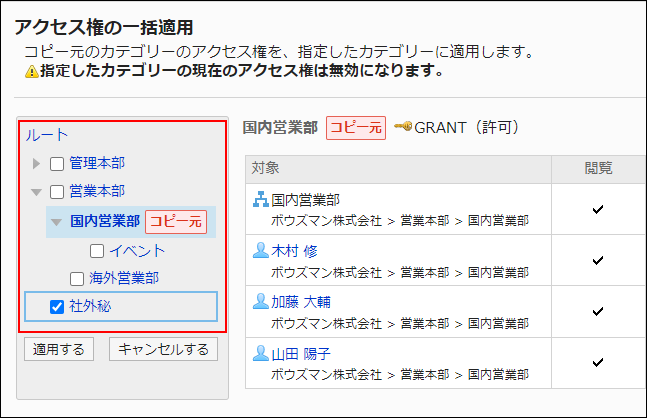
-
Confirm your settings and click Save.